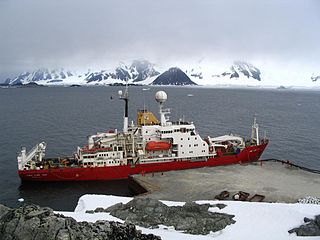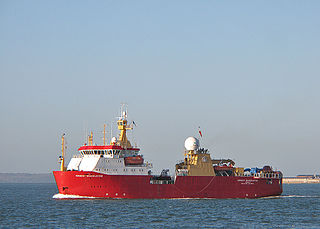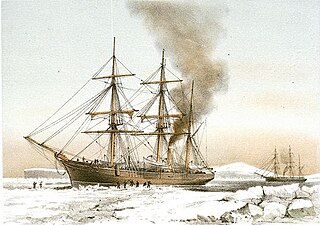Related Research Articles

HMS Endeavour was a British Royal Navy research vessel that Lieutenant James Cook commanded to Australia and New Zealand on his first voyage of discovery from 1768 to 1771.

The RRS Discovery is a barque-rigged auxiliary steamship built in Dundee, Scotland for Antarctic research. Launched in 1901, she was the last traditional wooden three-masted ship to be built in the United Kingdom. Her first mission was the British National Antarctic Expedition, carrying Robert Falcon Scott and Ernest Shackleton on their first, and highly successful, journey to the Antarctic, known as the Discovery Expedition.

The Royal Naval Reserve (RNR) is one of the two volunteer reserve forces of the Royal Navy in the United Kingdom. Together with the Royal Marines Reserve, they form the Maritime Reserve. The present RNR was formed by merging the original Royal Naval Reserve, created in 1859, and the Royal Naval Volunteer Reserve (RNVR), created in 1903. The Royal Naval Reserve has seen action in World War I, World War II, the Iraq War, and War in Afghanistan.

The United States Merchant Marine Academy is a United States service academy in Kings Point, New York. It trains its midshipmen to serve as officers in the United States Merchant Marine, branches of the United States Armed Forces and the transportation industry. Midshipmen are trained in different fields such as marine engineering, navigation, ship's administration, maritime law, personnel management, international law, customs, and many other subjects important to the task of running a large ship.

Standing Royal Navy deployments is a list of operations and commitments undertaken by the United Kingdom's Royal Navy on a worldwide basis. The following list details these commitments and deployments sorted by region and in alphabetical order. Routine deployments made by the Navy's nuclear-powered submarines and their location of operations is classified.

Noosfera is a polar supply and research ship operated by the National Antarctic Scientific Center of Ukraine. Until 2021, she was operated by the British Antarctic Survey and named RRS James Clark Ross.

Massachusetts Maritime Academy is a public university in Buzzards Bay, Massachusetts, focused on maritime-related fields. It was established in 1891 and is the second oldest state maritime academy in the United States. Originally established to graduate deck and engineering officers for the U.S. Merchant Marine, the academy has since expanded its curriculum. Though not required, some graduates go on to serve in active and reserve components of the U.S. Armed Forces. The academy operates a training ship, the USTS Kennedy.

Laura Bassi is an icebreaking research vessel operated by the Italian National Institute for Oceanography and Applied Geophysics,. Between 1999 and 2019, she was the British Antarctic Survey (BAS) logistics ship, primarily used for the resupply of scientific stations in the Antarctic.

HMS Dauntless is the second ship of the Type 45 or Daring-class air-defence destroyers built for the British Royal Navy. She was launched at Govan in January 2007, was handed over to the Royal Navy on 3 December 2009 and was formally commissioned on 3 June 2010.
The British Antarctic Survey (BAS) is the United Kingdom's national polar research institute. It has a dual purpose, to conduct polar science, enabling better understanding of global issues, and to provide an active presence in the Antarctic on behalf of the UK. It is part of the Natural Environment Research Council (NERC). With over 400 staff, BAS takes an active role in Antarctic affairs, operating five research stations, one ship and five aircraft in both polar regions, as well as addressing key global and regional issues. This involves joint research projects with over 40 UK universities and more than 120 national and international collaborations.

HMS Discovery was a wood-hulled screw expedition ship, and later storeship, formerly the sealing ship Bloodhound built in 1873 in Dundee. She was purchased in 1874 for the British Arctic Expedition of 1875–1876 and later served as a store ship. Discovery was sold in 1902, reverting to the name Bloodhound and her previous sealing trade. The ship was wrecked in Newfoundland in 1917.

RRS Shackleton was a Royal Research Ship operated by the British scientific research organisations the Falkland Islands Dependencies Survey (FIDS), British Antarctic Survey (BAS) and Natural Environment Research Council (NERC) in the Antarctic from 1955 to 1983. She was subsequently operated as a seismic survey vessel under the names Geotek Beta, Profiler and finally Sea Profiler before being scrapped in 2011.

SS Imo was a merchant steamship that was built in 1889 to carry livestock and passengers, and converted in 1912 into a whaling factory ship. She was built as Runic, renamed Tampican in 1895, Imo in 1912 and Guvernøren in 1920.
A master mariner is a licensed mariner who holds the highest grade of seafarer qualification; namely, an unlimited master's license. Such a license is labelled unlimited because it has no limits on the tonnage, power, or geographic location of the vessel that the holder of the license is allowed to serve upon. A master mariner would therefore be allowed to serve as the master of a merchant ship of any size, of any type, operating anywhere in the world, and it reflects the highest level of professional qualification amongst mariners and deck officers.

Admiral John Luce, was a senior officer in the Royal Navy during and after the First World War. He played a significant role in the early development of British naval aviation and held command during the Battle of Coronel and the Battle of the Falkland Islands in the South Atlantic.
Captain Roy Henry Stanbrook was Chief Executive of the Gibraltar Port Authority and Captain of the Port in the British Overseas Territory of Gibraltar before becoming the Harbour Master of the Port of Melbourne, Victoria in April 2014. His position prior to the 2012 appointment was that of Harbour Master for the Lower District of the Port of London Authority in the United Kingdom. He was succeeded by Gibraltarian Captain Bob Sanguinetti.

Boaty McBoatface is the British lead boat in a fleet of three robotic lithium battery–powered autonomous underwater vehicles (AUVs) of the Autosub Long Range (ALR) class. Launched in 2017 and carried on board the polar scientific research vessel RRS Sir David Attenborough, she is a focal point of the Polar Explorer Programme of the UK Government.

RRS Sir David Attenborough is a research vessel owned by the Natural Environment Research Council and operated by the British Antarctic Survey for the purposes of both research and logistic support. The ship replaces a pair of existing vessels, RRS James Clark Ross and RRS Ernest Shackleton. The vessel is named after broadcaster and naturalist Sir David Attenborough.
Jo Cox (1974–2016) was a British politician.
References
- 1 2 "Captain Jo Cox: Profile of the new Falklands Harbour Master". Nicholas Roberts - Journalist. Retrieved 2022-05-03.
- 1 2 3 Hutchinson, Lydia. "Who are we?". www.falklands.gov.fk. Retrieved 2022-05-03.
- 1 2 "Annual Report" (PDF). Government of South Georgia and the South Sandwich Islands Annual Reports. 2014: 2, 14. 2014.
- ↑ programme, UK Shelf Sea Biogeochemistry. "Meet Jo Cox, the first female captain of any NERC owned research vessel". UK Shelf Sea Biogeochemistry. Retrieved 2022-05-03.
- ↑ "Historic new appointments for maritime women in the Falkland Islands". www.nautilusint.org. Retrieved 2022-05-03.
- ↑ "Historic new appointments for women mariners in the Falklands - Maritime Direct". 2021-05-20. Retrieved 2022-05-03.
- ↑ "RRS Sir David Attenborough arrives in the Falkland Islands | Falkland Islands Television". 2021-12-10. Retrieved 2022-05-03.